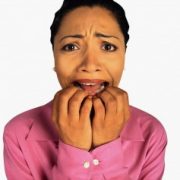Test Anxiety: How to Deal With It.
At the end of July all over the country, thousands of people will take the bar exam and fail due to test anxiety.
The failure rate in California in 2004 was 56 percent. Although some will fail because they are not worried enough, many will fail because they are worried to the point of test anxiety.
Test anxiety can show up as early as first and second grades as well as in high school. A 2006 U.S. Department of Education-funded study conducted by the Institute of HeartMath and Claremont Graduate University with 980 10th-grade students found that 61% of all students reported being affected by test anxiety.
What is test anxiety?
It is a psychological condition where the test taker feels severe distress before, during and after the test; one can get so nervous and anxious about doing well (or just passing), that performance on a test is negatively affected. If you know how a college final can produce this type of anxiety, then imagine having test anxiety while taking the bar exam, or an exam for licensure, where the stakes are high and there has been a significant investment in both money and time.
It’s normal to have some type of nervousness about taking a test and in fact, this nervousness can be helpful by getting us into a state where we are pumped up to do well. When this nervousness escalates into test anxiety, however, it can not only interfere with recall of information but may create a reaction so intense that it some people give up taking the exam entirely, or continue to put it off until “someday”.
Test anxiety is a form of performance anxiety.
Performance anxiety is where someone is extremely nervous about having to produce a result in a limited time period or in front of people who are judging them. Test anxiety, stage fright, fear of public speaking and “choking” in sports performance fall into this category.
Symptoms of performance anxiety are similar to most other forms of anxiety reactions: rapid heartbeat, sweaty palms, shortness of breath, shakiness, confusion, or other physical aches or pains such as nausea or a stomach ache.
In my work as a hypnotherapist with people who are challenged by test anxiety, I notice that many of these people share similar characteristics, such as being prone to high stress, having perfectionist tendencies, or worrying a lot. Most instances of test anxiety can be dealt with in just a few hypnotherapy sessions, but here are some suggestions you can put to use right away.
Tips for dealing with text anxiety
• Diet can affect your ability to think and recall information. If you are skipping meals or eating meals or snacks high in carbs while studying for an exam, then you may be experiencing episodes of low blood sugar (blood glucose). Since the organ that uses the most glucose is the brain, a balanced diet can be helpful in creating optimal brain power. Have healthy snacks while you study.
• Sleep seems to go by the wayside when students are preparing for exams. Plan your study time for when you feel the most alert, which for most people is not usually late at night. But if that works for you, then make sure you’re getting the amount of sleep that’s right for you. It’s probably more than you think. It makes sense to be well rested in the days leading up to a major exam, yes?
• Lack of preparation can cause test anxiety. Last minute cramming can leave you feeling like you are not ready, creating anxiety. Manage your time by organizing your schedule to give yourself the best conditions for learning. Decide ahead of time when, and for how long you will study. I suggest studying in periods of 50 minutes to one hour, with 10 to 15 minute breaks in between.
• Effective Preparation. Many people will only prepare for an exam by cramming the information into their heads. This is only half the equation; taking the test will involve recalling the information. Prepare for the exam by taking as many practice tests as you can as soon as you can. This will also clue you in as to what areas require more study.
• Watch your self talk. Self talk is your internal language or thoughts. Avoid scaring yourself with inner conversations like “I know I’m going to just blank out right in the middle of the test!” or “I just suck at taking tests!” Give yourself encouragement and support. Use positive affirmations in the days and weeks leading up to the exam. (Click here to read more about affirmations.)
• Mental visualization can be one of the most effective techniques you can use to mentally “rehearse” taking the test while feeling calm, relaxed and comfortable. See yourself walking out of the testing location feeling good about your performance. Imagine receiving the information that you have passed. Setting a goal of passing with a particular score increases the chances that you will.
• Extreme self care might be getting massages in the days or weeks before the exam to release excess tension and stress. Get a good night’s sleep the night before the exam, and don’t even thing about showing up without eating a good meal with protein. Daily walking or any type of exercise can also be a great stress reliever. Remember, anxiety comes from prolonged stress and tension. Find ways to release it.
For the most part, test anxiety is a learned response. With practice, you can unlearn test anxiety and learn a different reaction. Have faith in your brain, and cultivate a strong and abiding belief that you can and will pass!










Trackbacks & Pingbacks
[…] often have to deal with anxiety about tests, more homework, scary teachers and fellow students, and the transition from no school to back to […]
Comments are closed.